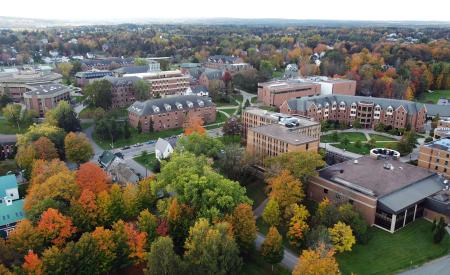PPE student Michael Nolan researches ticks and Lyme disease with wildlife management focus
 Third-year Philosophy, Politics, and Economics student Michael Nolan spent his summer researching a new area of study for him — ticks and Lyme disease. After speaking with Canadian Politics professor Dr. Mario Levesque about a summer research opportunity in the area, Nolan settled on a wildlife management focus for his project. His research was supported by a grant from the Canadian Lyme Disease Foundation.
Third-year Philosophy, Politics, and Economics student Michael Nolan spent his summer researching a new area of study for him — ticks and Lyme disease. After speaking with Canadian Politics professor Dr. Mario Levesque about a summer research opportunity in the area, Nolan settled on a wildlife management focus for his project. His research was supported by a grant from the Canadian Lyme Disease Foundation.
“Lyme disease risk is on the rise in Canada because blacklegged ticks have increased in numbers,” he says. “Government has focused primarily on communicating personal preventative and habitat modification measures to prevent Lyme disease, though they have neglected a wildlife management approach to Lyme disease prevention.”
Since ticks reproduce on hosts such as deer, Nolan focused his research on two areas that currently have an urban deer overpopulation problem — his hometown of Truro, NS and Saint Andrews, NB — and examined overall Lyme disease prevention in each province.
The overarching objective of the research was to illuminate the connection between Lyme disease prevention and urban deer overpopulation. The establishment of this connection helps to determine the effectiveness and appropriateness of Lyme disease preventative measures, to identify best practices relating to the management of an urban deer overpopulation problem, and illustrate how a focus on Lyme disease prevention can act as a policy tool to mitigate the social implications of urban deer overpopulation.
Nolan says in 2018, New Brunswick reported 20 cases of Lyme disease in the province. In the same year, Nova Scotia reported 451.
“Overall, research seems to be just one big learning process, but there were a lot of things that I found surprising about my research,” says Nolan.
Nolan found there was a lack of commercially-available products to manage reservoir hosts of the blacklegged tick. With more research, he says, wildlife management practices, like the use of Select Tick Control System, show some promise in reducing blacklegged tick abundance. Many of the commercial practices are currently not available in Canada. He was also surprised by the deer bow hunting strategies implemented in both Truro and Saint Andrews, which have been productive, but also remain a safety concern for residents.
Levesque is thrilled with the comprehensiveness of Nolan’s investigation, which included literature reviews, case studies, and interviews with key officials. He is currently working with Nolan to turn the research into a journal article.
“Michael is an extremely engaged and capable student,” says Levesque. “The analysis is extensive and supported with sound evidence. Lyme disease is a rapidly emerging health issue in the Maritimes, yet social science research on ticks, the carriers of Lyme disease, and their hosts (e.g., deer) is lacking. Solutions are needed and this is why disentangling the social acceptability of solutions and provincial wildlife management policies is important.”
Nolan says this undergraduate research experience has enhanced his overall academic and personal experience at Mount Allison.
“This research has engaged me and made me a better writer and academic,” he says. “It has also allowed me to build a great connection with my professors.”
Nolan is highly involved on campus as the VP Finance and Operations with the Mount Allison Students’ Union (MASU). In past years he was captain of the lacrosse team, social chair for Windsor Hall, a member of the Debate Society, and participated in finance and operations committees on the MASU. Last year, he participated in an academic year internship with local MLA Megan Mitton.
Nolan will be continuing his work in this area this term with a policy-focused independent study in wildlife management. After Mount Allison, he plans to pursue graduate studies and a career in the civil service.




